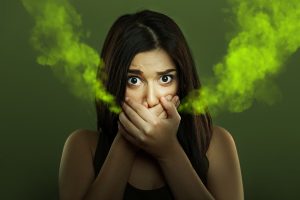Bad breath (halitosis) is something that you or your child does not need. In children bad breath may even be more important to treat as it could have social consequences. Other kids may avoid the child with halitosis. Recently an article reviewed this topic.
There are three different types of halitosis.
Bad breath in the morning
When a child or adult wakes up in the morning with bad breath, it could be that the person slept with the mouth open. When the mucous in the mouth dries up overnight, it can cause bad morning breath. Saliva has a natural antiseptic effect suppressing bacterial growth. When it is dried up, it can become the cause of halitosis in the morning.
Temporary bad breath
Forgetting to brush one’s teeth after a meal will allow bad breath bacteria to multiply. This does not only happen after eating garlic or onions!
It is important to brush your teeth after each meal. Even when consuming a snack, the sugar in it will stimulate halitosis bacteria to multiply. It is better to brush your teeth too often than too little.
Chronic bad breath
Periodontal disease, respiratory disease and ulcers can cause chronic halitosis. The stomach bacteria H. pylori may be partially to blame for chronic bad breath.
How to treat bad breath
Brush your teeth
There are several steps you can take to treat or prevent halitosis.
Brush your teeth at least twice a day. It is even more effective to brush after each meal and snack with fluoride toothpaste. Also floss your teeth once or twice per day. This reduces the bad breath bacteria in your mouth and gums.
Rinsing with a mouth wash
Some dentists or physicians recommend rinsing your mouth with a bacteria-fighting mouthwash. In view of newer literature about the gut biome, this practice should be abandoned. By using a bacteria-fighting mouthwash you can permanently change the gut biome, which can lead to leaky gut syndrome.
Avoid candies and sweets
We know for a long time now that candies and other sweets stimulate tooth decay bacteria. They can also cause halitosis.
Garlic and onions
The sulphur substance, mercaptan, is a part of garlic and onions. The gut absorbs mercaptan, it travels though the lungs and you exhaled it finally in your breath. The garlic/onion odor can persists in the breath for 2 to 3 days following a meal that contains them. Avoid eating them 3 days prior to a social event.
Avoid stress as much as possible
Exposure to too much stress can change your hormones, which in turn will change your saliva composition. Finally, this can cause halitosis. Relaxation methods like yoga, self-hypnosis, meditation, or Tai-Chi classes can counter stress.
Conclusion
We are not always aware what we are doing to ourselves. Before you know it, this can lead to bad breath. It could be stress that changes your hormones and the saliva composition. You may not brush your teeth often enough or you may neglect to floss. Be aware that candies and sweets can change your mouth flora and lead to bad breath. Finally, watch your onion and garlic consumption. They may be wonderful in a meal, but if you plan a social gathering, stop eating them 3 days before.







